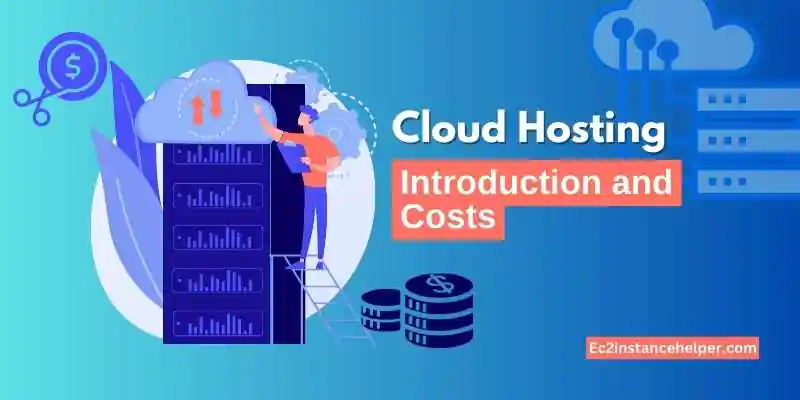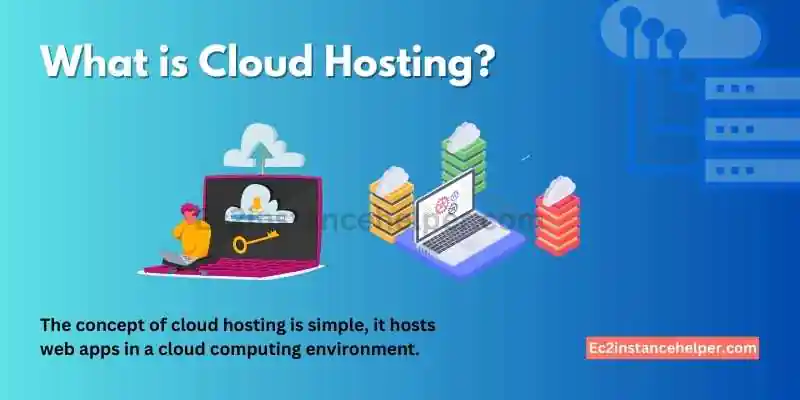In the digital era, harnessing the power of the cloud has become a game-changer for businesses and individuals alike. As financial management takes center stage in our lives, understanding the potential of cloud hosting becomes essential in optimizing costs and driving efficiency.
We embark on a journey to explore the world of cloud hosting, shedding light on its introduction and associated costs. Discover how cloud hosting empowers you to take control of your finances by offering scalable solutions tailored to your needs. From startups seeking cost-effective options to established enterprises looking for enhanced performance, the cloud presents a myriad of benefits. This guide aims to equip you with valuable insights and strategies to make informed decisions about hosting solutions, ensuring you maintain control over your finances without compromising on performance. Embrace the cloud and take charge of your financial destiny in the digital age. Let’s embark on this empowering journey together.
Cloud hosting has revolutionized the hosting industry, which improves hosting reliability and resilience for clients. Cloud hosting cost is one of the best things about getting an enhanced cloud hosting service. If you sign up for a simple web hosting plan, you’d get a plethora of resources on a single server. The resources you get will depend on the plan of your choice. While getting a simple web hosting plan may work for a simple website, limited or fixed resources can be a problem for businesses with bigger needs. Usually, there’s no way to boost your allocated resources such as RAM or bandwidth if you experience a sudden increase in traffic, and upgrading even the simplest of plans may require your website to experience downtime. Before you can finally decide between web hosting and cloud hosting, you need to know about the cloud server cost and other information.
Cloud hosting plans are pretty similar to virtual private servers (VPS). In VPS plans you pay for a specific amount of web space, RAM, CPU time, and bandwidth. But the resources you get are spread over multiple devices instead of a single one, which makes upgrading or changing your plan easier later on. There are also options for small business web hosting, and cloud hosting is scalable and can act as a good alternative for a dedicated server.
Cloud hosting is great, it can be used for almost everything from just hosting emails, to replacing your business server. Although, if you want a completely hands-on experience, then you should choose a Linux-based server instead of Windows.
Even if you can get a cheap cloud server, cloud hosting isn’t really for everyone. If you just have a small website, then you will be better off getting regular web hosting, instead of cloud hosting packages. But if your project has heavy requirements, or if you have multiple projects to run, cloud hosting will be a better option. In this guide, we’ll explain what is cloud hosting, what cloud hosting cost, and the best cloud hosting service providers.
What is Cloud Hosting?
The concept of cloud hosting is simple, it hosts web apps in a cloud computing environment. Other hosting services such as shared web hosting make your website share resources with several other websites all supported by a single server. This sharing of resources leads to limitations when it comes to processing power, handling traffic surges and so much more. If your website or web app requires more resources you can look for a virtual private server or a dedicated server both of which offer more control and flexibility over your environment. Regardless of the range of plans you choose, you’re still stuck on a single server. When you opt for a cloud hosting model, you can leave that single hosting model behind. Cloud hosting plans allow you to use computing power from multiple servers simultaneously.
The power of multiple servers in cloud hosting offers you a significant edge over traditional hosting plans. Let’s say your website experiences a sudden jump in traffic, cloud hosting can use allocated resources from other servers to prevent slow page loading or downtime. Plus, cloud hosting makes the process of scaling your website upwards or downwards seamless. With traditional hosting plans, you may need to pick a different plan to scale your website which also increases the cost. Cloud server cost remains the same even if you need to scale your website.
There are multiple types of cloud hosting, traditional web hosts such as DreamHost and HostGator, offer cheap cloud server plans that are similar to other web hosting plans (VPS). These plans are small business-friendly and work perfectly for businesses with limited resource needs.
If you need enterprise-level cloud computing plans, then you’d have to go on knocking at the doors of Amazon Web Services and Microsoft Azure. They offer complete cloud hosting plans that can be used for a wide range of things.
Best Cloud Hosting Providers
1. Hostinger
Hostinger is one of the best cloud hosting service providers that you’ll come across and they offer versatile and reliable plans. The plans are fully managed and powerful, this cloud service utilizes the latest technologies to prevent redundancy and improve performance. While the Hostinger system managers take care of their updates and maintenance, your team can focus on improving your online presence with incredible computing power.
The Hostinger cloud server cost is low and it is perfect for small to mid-sized businesses. You can host up to 300 websites with unlimited bandwidth. You get free domain registration, dedicated IP address, free SSL and so much more.
Hostinger also provides users with a dedicated support team. 24/7/265 cloud support team monitors and maintains machines so the websites and web apps keep running smoothly. The only downfall of this “always available” customer support team is that they only reply over email. There’s no option for phone support or live chat.
Hostinger cloud hosting cost is as follows:
- Cloud Startup: $7.45/mo
- Cloud Professional: $14.95/mo
- Cloud Global: $37/mo
Keep in mind that all these prices are applicable only if you choose a 4-year prepayment.
Pros of Hostinger Cloud Hosting:
- Enough Resource Allocation
- Daily Backups
- Free dedicated IP, SSL, Domain
- Integrated Caching
- LVE Containers
- US, UK, EU, Asia, Brazil Data Centers
- 30 Days Money Back Guarantee
- Fully Managed hosting
Cons of Hostinger Cloud Hosting:
- No sales support
- Only 3 plans create limitations
2. Scala Hosting
Scala Hosting is another versatile cloud hosting provider that offers great services. Users can benefit from a fully managed cloud environment enhanced with several proprietary technologies. One of the most unique things about Scala is that they guarantee 100% customer satisfaction. Based on customer reviews, we can say that their guarantee is upheld. Users are free to choose custom resource allocation for your server without having to pay any extra cloud server cost. If your website or web app needs more CPU power, then you can choose additional processing power in your plan. This way you can choose the desired resources on your plan and avoid paying extra on the plan.
Users can scale up to 24 CPU cores, 32GB Ram, and 50GB storage which is more than enough to support most complex projects.
Scala also provides a free control panel named “SPanel,” where most providers ask users to pay an extra amount for a control panel. The Scala control panel offers everything cPanel does, and it also helps in integrating with popular software such as WHMCS.
If you want the familiar feel of cPanel, then you can get licenses for that too by paying extra. Other hosting providers are often lacking in customer support, but Scala offers great features in that department as well. The support team is available 24/7 and all your queries get a quick response.
If your problem is complicated, then the live chat agents will transfer the query to server admins who will then fix your problems within minutes.
The prices for Scala hosting plans are as follows:
- Start: Starting price $9.95/mo, renewal at $13.95/mo
- Advanced: Starting price $21.95/mo, renewal at $25.95/mo
- Business: Starting price $41.95/mo, renewal at $49.95/mo
- Enterprise: Starting price $63.95/mo, renewal at $67.95/mo
Scala Hosting’s cloud server cost is the only complicated thing about their whole plans. To get a cheap cloud server plan, you should sign up for a 3-year deal.
Pros of Scala Cloud Hosting:
- Both managed and unmanaged plans
- All essential features available
- Customizable and scalable plans
- Affordable fixed plans
- All-around tech and sales support
- Free SPanel and paid CPanel options
- Security monitoring with SPanel shield
- Best renewal prices
Cons of Scala Cloud Hosting:
- No root access for SPanel plans
- No free domain name on unmanaged plans
- Only EU, US data centers
- Centos8 OS only available on managed plans
3. Hostgator
Anyone who knows anything about hosting services has undoubtedly heard of HostGator. Even after years in the industry, they’re offering the same level of service as their first day. HostGator was one of the first companies in the web hosting market and they took advantage of their lack of competitors.
HostGator is one of the largest providers in the market even today, hosting over 8 million domains. They account for 1% of all online traffic, which is more than impressive. HostGator offers pretty much every type of service you can expect and that includes a cheap cloud server.
Users can get three different cloud plans for their needs. The smallest plan is quite limited, as you can only host one domain name and get only 2GB of memory. Fortunately, things start to get better on the higher-end plans.
On the higher plans, users get nice features such as a free dedicated IP address and a free SSL certificate. Storage and bandwidth are unmetered, and that’s one of the best things about HostGator plans.
Even after being an industry leader, HostGator’s customer support is pretty disappointing. The live agents often fail to provide a satisfying result. Most of the time, they’ll end up sending links from their knowledge base. They also have a ticketing system of a toll-free number, but you’ll end up getting the same result.
The HostGator cloud hosting cost is as follows:
- Hatchling Cloud: $4.95/mo
- Baby Cloud: $6.57/mo
- Business Cloud: $9.95/mo
Pros of HostGator Cloud Hosting:
- Unmetered space/bandwidth
- Free SSL certificate
- Integrated caching
- Automated failover
- Statistics dashboard
Cons of HostGator Cloud Hosting:
- Poor customer support
- Questionable reputation
Benefits of Cloud Hosting
If you don’t think that cloud hosting is the right option for you, then maybe these benefits of cloud hosting will help you make up your mind. Some of the biggest advantages of using cloud hosting are:
- Performance: Instead of relying on a single server, cloud hosting allows you to maximize the resources so your websites and web apps can run smoothly. This configuration allows you to leverage several resources and handle traffic surges without sacrificing performance.
- Scalability: The biggest benefit of a cheap cloud server is scalability. With several on-demand resources at your fingertips, you can adapt to your needs. If you need additional gigs of space or another CPU core, it’s all available with cloud hosting without you needing to upgrade to a higher plan.
- Availability: Server downtimes can cause you to lose a lot of revenue and traffic. What makes cloud hosting amazing is that it doesn’t restrict you to a single device and if a single machine faces downtime, it won’t affect your website’s or web app’s downtime.
- Customization: Compared to shared web hosting or VPS, you get more freedom to make changes to the cloud environment as per your needs. This comes in handy when you have the right knowledge of tools and technologies. But if you don’t want to get into administrative work, you can opt for a managed cloud hosting plan. The cloud server cost of managed plans may be higher than unmanaged plans, but in the long run, they help you save money.
Conclusion: Cloud Hosting
This marks the end of our guide on cloud hosting. Hopefully, this introduction to cloud hosting helped you understand the features, benefits, and cloud server cost. If you’re looking for cloud hosting providers, then it’s best to choose from any of the top cloud hosting providers that we’ve mentioned above.



